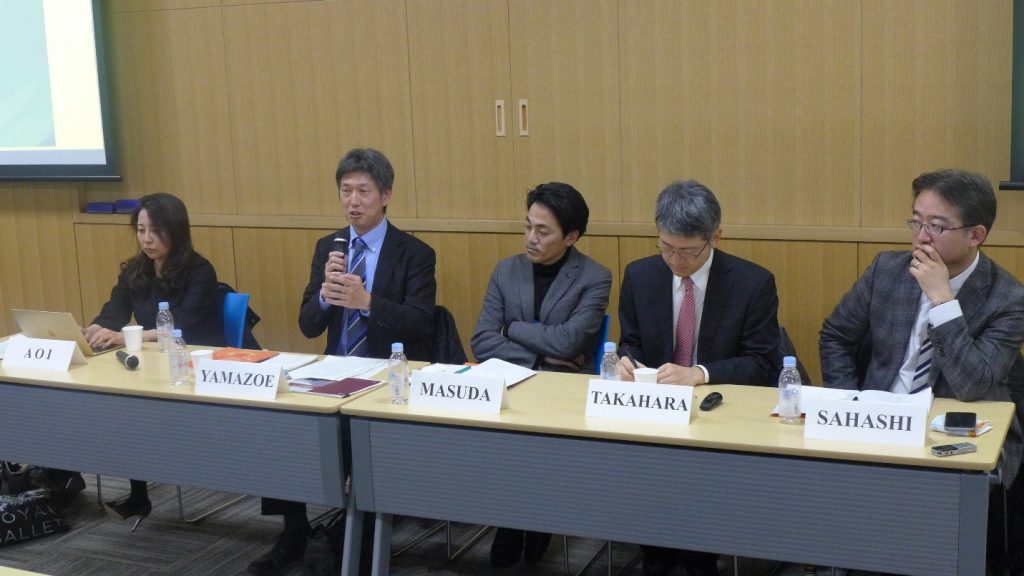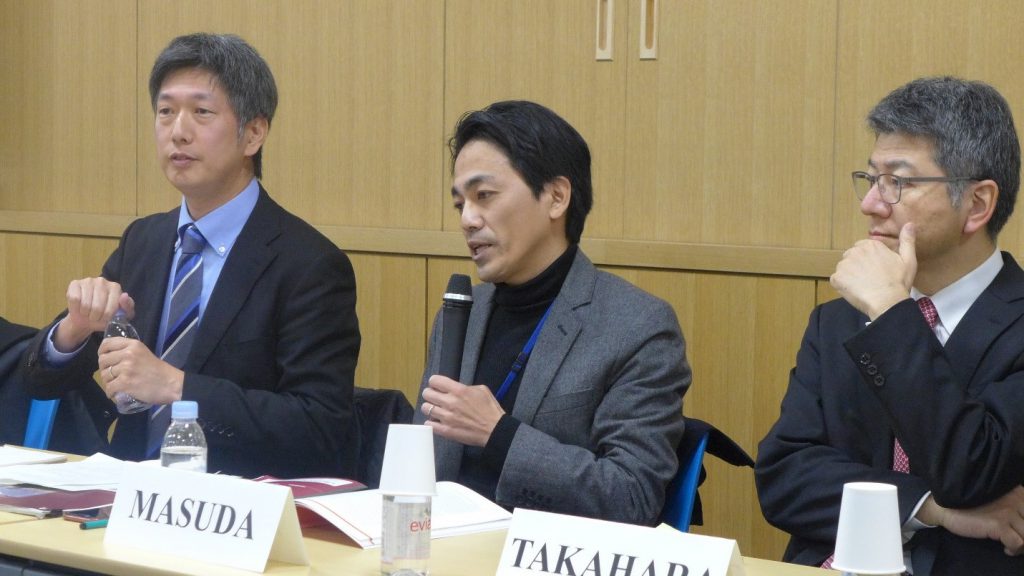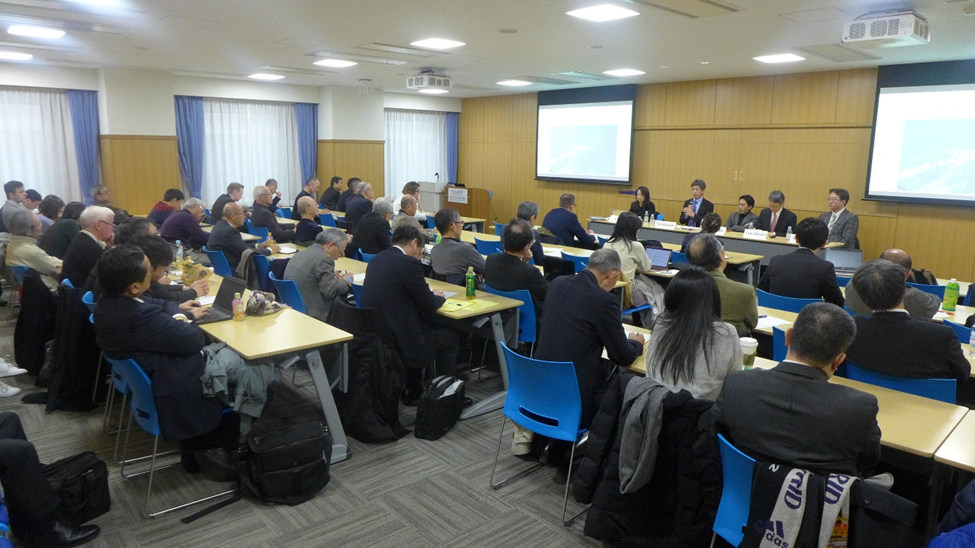SSUフォーラム/GraSPPリサーチセミナー “China’s Approach to Eurasia: Its Visions and Impact”
-
日程:2020年01月07日(火)
-
時間:10:30-12:00
-
会場:東京大学本郷キャンパス 国際学術研究棟4F SMBCアカデミアホール
MAP -
題目:
China’s Approach to Eurasia: Its Visions and Impact
-
言語:
英語
-
定員:
80名
-
主催:
東京大学未来ビジョン研究センター安全保障研究ユニット
GraSPPリサーチセミナー
未来ビジョン研究センターとGraSPPリサーチセミナーは、今後の活動についての情報を提供するため皆様の個人情報を収集させていただいております。
この情報はいかなる第三者にも開示致しません。
- 報告:増田 雅之(防衛研究所(NIDS)地域研究部中国研究室主任研究官)
- 報告:山添 博史(防衛研究所(NIDS)地域研究部米欧ロシア研究室主任研究官)
- 報告:高原 明生(東京大学公共政策大学院院長・法学政治学研究科教授)
- 報告:佐橋 亮(東京大学東洋文化研究所准教授)
- 司会:青井 千由紀(東京大学公共政策大学院教授)
China’s diplomacy with Eurasia, particularly the countries of Central Asia, is comprised of economic regionalism and diplomatic soft balancing against the United States. Yet, China did not find it always easy to form a unified position on the direction regionalism will take and how to deal with the United States with Russia and the Central Asian Republics. While Beijing still emphasizes the importance of regional multilateral cooperation on the one hand, bilateral relations dominates the approach to its neighbors in promoting the Belt and Road Initiative (BRI).
The Central Asian Republics, for example, have a different set of traditions from China such as civil and military bureaucracy conducted in Russian. Further, memory is still fresh from the 1960s border clash with China, resulting in a wide-spread fear of the Chinese expansion. There are sometimes demonstrations protesting the growing presence of Chinese in the region.
Beijing, having to take these factors into consideration in its approach towards Central Asia, adopted a careful approach, and ultimately such countries accepted such new Chinese initiatives as the Silk Road Economic Belt (SREB) vision, thus improving connectivity in economic relations between China and its regional neighbors. Seeking to protect that improving connectivity, Beijing is also advancing functional security cooperation with Eurasian countries, specifically law enforcement cooperation.
In this seminar, experts from the National Institute for Defense Studies (NIDS) and the University of Tokyo will discuss various policy issues surrounding China-Russia and China-Central Asia relations over issues such as the BRI, energy policy, and an emerging security architecture on the Eurasian continent. The global implications of developing diplomatic relations and economic connectivities in the region will be assessed.
*The NIDS China Security Report 2020 is the 10th in a series published by the National Institute for Defense Studies since 2011. The 2020 report analyzes China’s strategic trends on the Eurasian continent. The Japanese, English and Chinese editions of the report are accessible on the NIDS Website: http://www.nids.mod.go.jp/english/publication/chinareport/index.html
MASUDA Masayuki is Senior Fellow in the China Division at the National Institute for Defense Studies (NIDS). He joined NIDS in 2003 and has been Visiting Fellow at Shanghai University, Visiting Scholar at the East-West Center, and Visiting Academic at the Daniel K. Inouye Asia-Pacific Center for Security Studies (DKI APCSS). He has written a number of articles and books on Chinese foreign policy and security, the recent of which are “China’s Eurasian Diplomacy,” NIDS China Security Report 2020 (November 2019); Geopolitics in Contemporary Japan, co-author (Tokyo: Chuokoron-Shinsha, 2017); China as Major Power (Tokyo: Ichigeisha, 2017).
YAMAZOE Hiroshi is Senior Fellow at the National Institute for Defense Studies (NIDS). His research interests are mainly Russian security policy and international history in East Asia. He obtained an MA in Russian Studies from School of Slavonic and East European Studies, University College London in 2005, and a Ph.D in Human and Environmental Studies from Kyoto University in 2008. He has been working at NIDS since 2008 and was a visiting fellow at Royal United Services Institute (RUSI) in 2012. His works include “Chapter 2: The Growing Influence of China as Seen from Central Asia and Russia,” NIDS China Security Report 2020, NIDS, November 2019; “Sino-Russian Cooperation from the Perspective of the U.S.-Japan Alliance,” Asia Policy, vol. 13, no. 1, National Bureau of Asian Research, January 2018; “Russia’s Eastward Approach to East Asia: The Qing, Japan, and Boundary Issues with Russia” in Takashi Okamoto ed., A World History of Suzerainty: A Modern History of East and West Asia and Translated Concepts(Toyo Bunko, 2019).
Takahara Akio received his DPhil in 1988 from Sussex University, and later spent several years as Visiting Scholar at the Consulate-General of Japan in Hong Kong, the Japanese Embassy in Beijing, Harvard University, Peking University, and at the Mercator Institute for China Studies. Before joining The University of Tokyo, he taught at J. F. Oberlin University and Rikkyo University. He served as President of the Japan Association for Asian Studies, and as the Secretary General of the New Japan-China Friendship 21st Century Committee. He currently serves as Senior Fellow of the Tokyo Foundation for Policy Research, Senior Adjunct Fellow of the Japan Institute of International Affairs, and Distinguished Research Fellow of the Japan Forum on International Relations. His publications include The Politics of Wage Policy in Post-Revolutionary China, (Macmillan, 1992), and Japan-China Relations in the Modern Era, (co-authored, Routledge, 2017).
Sahashi Ryo specializes on international politics in East Asia. His recent book is In a Search for Coexistence: the United States and Two Chinas during the Cold War (Tokyo: Keiso, 2015). In English, he recently edited Looking for Leadership: The Dilemma of Political Leadership in Japan (Tokyo and New York: Japan Center for International Exchange, 2015), and wrote on the impact of rising China on Asian order, Japan’s security policy and Japan-Taiwan relations. Now he is writing his next book on US-China competition and leading two group studies on the alliance and order after the end of the Cold War.
Dr Sahashi has taught at Kanagawa University as professor until March, 2019 and has been Visiting Associate Professor, Walter H. Shorenstein Asia Pacific Research Center, Stanford University and Shigeru Yoshida Chair, Instituto Tecnológico Autónomo de México (ITAM). He joined Institute for Advanced Studies on Asia, the University of Tokyo from April, 2019.
Concurrently, he serves as Research Fellow, Japan Center for International Exchange and the member of UK-Japan 21st Century Committee. He regularly contributes to NHK, Nikkei, Asahi Shimbun, Mainichi Shimbun and other major media outlets.
He received his B.A. from International Christian University and his Ph.D. from the Graduate Schools for Law and Politics at the University of Tokyo. He also studied at Department of Political Science, University of Illinois at Urbana-Champaign. Born in 1978.
未来ビジョン研究センター(IFI)の安全保障研究ユニット(SSU)は、公共政策大学院との共催により、「ユーラシアへの中国の接近:ビジョンとインパクト」と題する研究セミナーを開催しました。防衛研究所主任研究官の増田雅之氏と山添博史氏を講師に招き、東京大学東洋文化研究所の佐橋亮准教授および公共政策大学院長であり中国政治の専門家である高原明生教授が討論者、安全保障の専門家である公共政策大学院の青井千由紀教授が座長を務めました。
増田氏と山添氏は、防衛研究所が発表した『中国安全保障レポート2020~ユーラシアに向かう中国』の研究結果について講演を行いました。

青井教授による紹介の後、増田氏は、中国が中央アジアへの影響力を拡大している状況に関して、以下の3点を説明しました。第1に、中国の対中央アジア政策を概観したうえで、第2に、当該地域に対する中国の利害関係を分析し、第3に、結果として構築されるであろう安全保障体制の見取り図を示しました。
増田氏によれば、上海協力機構(SCO)を2001年に設立して以降、中国は多国間経済統合政策を開始しています。しかし、中央アジアにおける自由貿易の確立は連携諸国にとって相互に有益であると見なされず、懐疑の目を向けられました。特に、経済的に中国よりも弱いロシアは、自国が優位性を保てる軍事や安全保障の分野での協力に意欲を示しました。2000年代前半には、対アフガニスタン政策におけるSCO内での連携創出に中国が失敗した経験があります。2000年代の後半の中国政府は、多国間関係よりも二国間関係によって中央アジアに進出する方針をとり始めていました。この方針は、3つの目標に一致しています。第1に、中央アジアと接する中国西部地域の経済開発、第2に、西側諸国との地政学的安定化(米国との間に海域をめぐる緊張関係が存在するにもかかわらず、中国政府は西側諸国との関係を安定化しようとしていました)、第3に、2015年から中国は、グローバル・ガバナンス改革のためのアジェンダに関連して、アジア大陸に豊かな地盤を見出していました。この最後の点に関しては、アジアインフラ投資銀行(AIIB)の設立や一帯一路構想の拡大が裏付けとなっています。安全保障協力という点から見ると、中国はより実用的な協力方法に向かっていると言えます。ガスや石油のパイプライン、道路と鉄道、送電線などの国境を超えるインフラ建設は、それらを維持するための協調の必要性を生み出します。その協調が、アドホックな安全保障領域を生み出し、新たな安全保障体制が出現することにつながります。ユーラシア大陸におけるこうした状況を日本はもはや看過できないと増田氏は語りました。

山添氏は、ロシア情勢の専門家として、ロシアの歴史と地政の観点から分析を行っています。中央アジアに関して以下の3点を説明しました。第1に、中国にとって中央アジアには可能性とリスクの両方があります。歴史的に、この地域の国境は帝国時代に、民族をまたいで引かれました。歴史的にロシア文化が支配的であった中央アジアにおいては、ロシア系が大きな存在感を示しています。中国の文化と言語は中国に近い地域においてでさえ確立されていません。連携の拡大には良い面もありますが、危険性もあります。旧ソ連諸国の多くは1960~70年代の国境紛争を記憶しています。中央アジア諸国の中には、中国企業の操業や中国人による土地の所有に対して明確な抵抗を示している国もあります。第2に、中央アジアの国々は、地域の枠を超えて行動範囲を拡大する地政学的な挑戦をしようとしているアクターと見なすべきです。例えばカザフスタンは、東西連携の軸を確立することに大変熱心です。中国と中央アジアの間には、ヘゲモニーよりも協力関係があると見る方が適切です。安全保障面では、人身取引や密輸を取り締まるために中国はタジキスタンの南東部におそらく数十人の兵士を駐留させています。いずれにせよ、中国はこの地域での中国の存在感に対してロシアが感じる不安を意識しており、ロシアとの摩擦を避けようとしているように見受けられます。中央アジア諸国は、ロシアと中国以外の、EU、アメリカ、日本との関係にも関心を示しています。第3に、山添氏はロシアの視点からの疑問を提起しました。ロシア政府が中国の存在感の高まりを懸念しているようであっても、両国が衝突しているわけではありません。ロシアは、中国の過剰な影響力に対抗するために協力を追求しているのです。これが、ロシアが中国との貿易協定案において低すぎる関税を拒む一方で、中国が依存している軍事技術をロシアから中国に提供する理由です。現時点では、中国政府もロシア政府も相互関係に満足しているように見受けられます。もし中国が経済的脅威となった場合には、ロシアは何らかの対抗措置をとる必要が生じるでしょう。
高原教授は、以下の3点についてコメントを述べました。第1に、一帯一路が始まった経緯を想起させました。習近平が2013年に政権の座に就いたとき、彼の外交政策は新たな超大国関係を築くことでした。当初、この政策はオバマ政権に受け入れられたものの、南シナ海などにおける中国の行動がアメリカ政府との関係を悪化させたことから、受け入れられなくなりました。一帯一路はこの失敗に基づき、中国の外交政策を立て直す方策としてつくられたものです。ここから、米中関係が悪化すると、中国の外交政策の振り子がユーラシアに向かうということが見て取れます。第2に、中国は実用的な国です。一帯一路は地政学的で大規模な計画であるだけではなく、ビジネスの側面も有しています。パキスタンのグワダル港など、一帯一路構想の一部には収益性がありませんが、中国が利益を生み出せるプロジェクトのみを進めることがますます重要になっています。しかし残念ながら、中央アジアの国々に関する多くのプロジェクトは、純粋な財政的観点からは利益にならないようです。第3に、ほんの数年前まで、ロシアは人がまばらにしか住んでいない極東に中国人が大量に移住し、領土を買収することを恐れていました。しかし、そのような事態は起こりませんでした。それどころか、現在のロシアはこの地域に多くの投資家を引きつけたいと考えていますが、中国はロシアと中央アジアを投資先として重視しているようには見えません。
佐橋准教授は、いくつかのコメントと質問を提示しました。最初の質問は、ユーラシアあるいは中央アジアの政治は、グローバルな安全保障問題ととらえるべきか、あるいは地域の安全保障問題ととらえるべきかです。佐橋准教授は地域の問題との見解を示しました。例えばアメリカ政府は、アフガニスタンをのぞく中央アジア地域を他の地域と比較して重要視していません。中国の行動も控えめであり、戦略的な利益を理解しがたい状況です。2つ目の質問は中国とロシアの関係についてです。過去20年間に大きな変化がありました。ロシアは、経済大国となった中国に対して低い立場で協力関係を築くことを受け入れられるのでしょうか。さらに、他の諸国に関する分析が含められていないようです。例えばアフガニスタンに対するインドの利害を軽視することはできません。アメリカは1990年代後半から2000年代前半にかけて中央アジアへの関心を示していましたが、現在では重要視していないように見受けられます。最後に、日本の利害はどうでしょうか。佐橋准教授は、エネルギーとテロリズムの問題以外では、日本にとって中央アジアは重要な地域とは見なされていないのではないかとの見方を示しました。

意見交換において、増田氏は高原教授に返答し、上海協力機構の設立を含む中央アジアでの政治活動を開始したのはロシアであったが、それらのイニシアティブを拡大したのは中国であったことを指摘しました。佐橋准教授の質問に対しては、この地域での中国の主な利害はエネルギーにあること、中国は今や世界最大のエネルギー輸入国であることを説明しました。日本に関しては、特に質の高いインフラの提供を通じた経済協力がこの地域に関与していく方法であると説明しました。
山添氏は、両討論者への返答として、ロシアは将来に関する明確なビジョンを持っているようには見えないと指摘しました。ロシア研究者の中には、中ロ関係とその均衡について深刻な疑問を抱いている人々がいます。ロシアの指導部は、経済分野は例外だとしても、ロシアは中国の対等なパートナーであるかのように成りすましているように見えます。ロシア領内では、一帯一路の進展が見られません。現在の彼らのアプローチは、軍事分野での利点を示すことで中国の目にメリットとして映ろうとするものです。
※本フォーラムは、当センターが委託を受けた外務省外交・安全保障調査研究補助金事業と関連したテーマで開催されたものです。